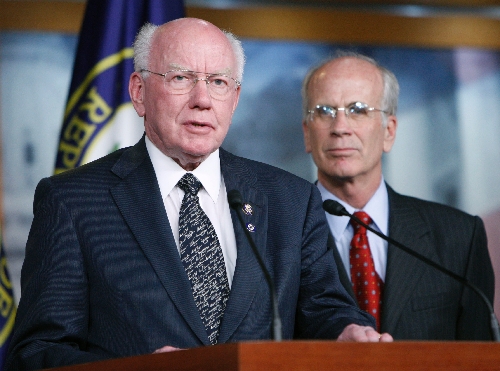House approves ‘Cash for Caulkers’ bill
WASHINGTON -- The House passed a bill last week that would grant rebates to people who renovate their homes to save energy.
Lawmakers voted 246-161 for the Home Star Energy Retrofit Act. It would offer rebates of up to $3,000 for energy improvements such as installing new insulation, windows or doors.
A separate part of the program would provide up to $8,000 to homeowners who conduct energy audits and take steps to reduce their home energy use by more than 20 percent.
It was nicknamed the "Cash for Caulkers" program, modeled after the "Cash for Clunkers" effort that paid people to trade in their old cars for more efficient models.
Supporters were mostly Democrats who said the two-year, $5.7 billion program would create 168,000 jobs in the construction industry and improve the environment.
They estimated 3 million homeowners would claim rebates.
Republicans questioned the benefits for what the program would cost taxpayers, and argued Democrats had not come up with a way to pay for the rebates.
Republicans also challenged whether the government could run the program effectively, pointing to complaints about the operation of the Cash for Clunkers effort.
Reps. Shelley Berkley and Dina Titus, both D-Nev., voted for the bill. Rep. Dean Heller, R-Nev, voted against it.
Telework bill falls short
Democrats didn't come up with enough votes to pass a bill that would encourage more federal employees to work from home.
The bill gained a 268-147 majority, but a two-thirds margin was needed for passage under a fast-track House floor process that sponsors had requested.
It would require each federal agency to set policies authorizing employees to telecommute "to the maximum extent possible without diminishing employee performance or agency operations," according to Rep. Jason Chaffetz, R-Utah.
Rep. John Sarbanes, D-Md., said almost 30 percent of the federal work force will retire or leave the government within the next five years.
"We need to be competing in the workplace and in the market for the most talented people," he said. "One way that you do that is to show that you have flexible policies."
Almost 20 million Americans telework, said Rep. Shelley Moore Capito, R-W.Va., adding the practice saves gasoline consumption, while reducing traffic and air pollution.
"I believe that instead of sitting in traffic for hours during the daily commute, time is better spent sitting down to dinner as a family, helping kids with their homework, or other important events that happen during the day," she said.
The bill drew opposition from lawmakers who noted it would increase agency administrative costs by $30 million over five years, and there was no way in the legislation to pay for it.
Berkley and Titus voted for the bill. Heller voted against it.
Wall Street reform
The Senate continued to debate a bill to overhaul how the government regulates the financial system, with leaders hoping to finish the bill this week.
During debate, senators killed an amendment by Sen. Richard Shelby, R-Ala., that critics said would have watered down the powers of a new federal consumer protection bureau.
The overhaul bill would create an independent agency within the Federal Reserve to regulate credit cards, mortgages, payday loans and other consumer-oriented financial instruments.
Minority Leader Mitch McConnell, R-Ky., argued it would intrude on the workings of small businesses and others who had nothing to do with risky Wall Street practices.
"The fact is, this agency is more about using this crisis as an opportunity to slip a vast new European-style regulatory bureaucracy past the American people than it is about holding Wall Street accountable," McConnell said.
The Republican amendment, supported by business interests, sought to alter the scope of the agency, moving it to the Federal Deposit Insurance Corp. and telling it to focus on big financial service providers.
But Sen. Christopher Dodd, D-Conn., the bill's primary author, said the GOP amendment would make "it easier for unscrupulous lenders to rip off the American public, businesses, and families. It is a stimulus package for scam artists."
"When it comes to writing new consumer protection rules, the Wall Street substitute -- and that is what it is -- relies on the same regulators who screwed up the country in the first place," Dodd said.
Sen. John Ensign, R-Nev., voted for the amendment. Sen. Harry Reid, D-Nev., voted against it.
Contact Stephens Washington Bureau
Chief Steve Tetreault at stetreault
@stephensmedia.com or 202-783-1760.

















